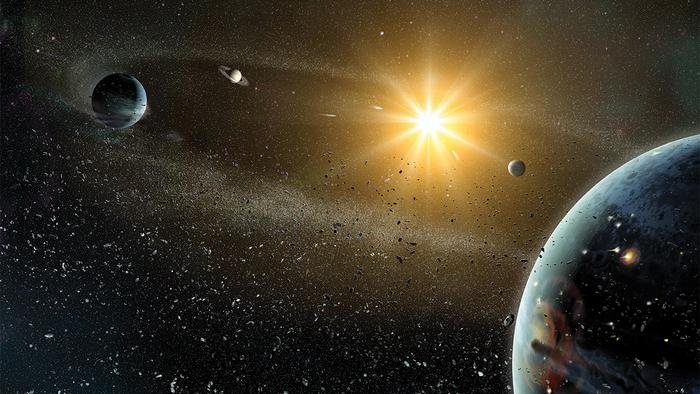New stellar models predict that gas giant planets can act as ‘agents of chaos’ in their solar systems by wreaking havoc on the habitable zone orbits of Earthlike planets that may harbor alien lifeforms.
Our solar system’s gas giants, Jupiter and Saturn, help protect the inner rocky planets, including Earth, from potentially catastrophic meteor and cometary collisions. However, this new research seems to show that our little corner of the cosmos is the exception and that, in many cases, massive gas giants likely have the opposite effect on potentially habitable systems.
Agents of Chaos Can Blast Habitable Zone Planets into Inhospitable Orbits
To determine if their theory was correct, the University of California, Riverside (UCR) researchers looked at actual exoplanet systems that contained gas giants. One candidate was a star system known as HD 141399. Approximately 121 light years away, which is practically next door in cosmic terms, this system contains four gas giants that orbit far from their host star. This is key, said researchers, as Jupiter and Saturn also orbit far from our sun, especially compared to Mercury, Venus, Earth, and Mars.
Next, the researchers gathered known data about this particular system and plugged it into computer simulations designed to replicate the real-world conditions of planetary orbits. As they explain in the published results, these four gas giants were more likely than not to act as so-called “agents of chaos” by altering the orbits of any rocky planets fortunate enough to reside in the star’s habitable zone, where life-sustaining liquid water can exist on its surface.
“It’s as if they have four Jupiters acting like wrecking balls, throwing everything out of whack,” said Stephen Kane, UC Riverside astrophysicist and author of the journal paper.
Notably, there were still some select simulations where the habitable zone rocky planets maintained a life-friendly orbit. But when asked if those were viable scenarios given the predicted effects of these four gas giants revealed in his team’s simulations, the UCR astrophysicist was more pessimistic.
“The answer is yes,” Kane conceded, “but it’s very unlikely. There are only a select few areas where the giants’ gravitational pull would not knock a rocky planet out of its orbit and send it flying right out of the zone.”
Second Paper Claims Even One Massive gas Giant Could Wreak havoc on Habitable Zone Orbits
Along with simulations showing the potentially devastating effects of four gas giants on any habitable zone planets that may reside in a system like HD 141399, a second paper titled ‘Agents of Chaos’ looked at the potential effects of a single gas giant on potential alien lifeforms and their planetary homes. In this case, that research zeroed in on a system known as GJ 357. At a relatively paltry 30 light years from Earth, this system is “definitely in our neighborhood,” according to Kane.
The target for this par5tucler research was a planet called GJ 357 d, which lies in the star’s habitable zone. Previous analysis pegged GJ 357 d at around six times the mass of Earth, but according to the UCR team, it appears to be much larger than that.
“It’s possible GJ 357 d is as much as 10 Earth masses, which means it’s probably not terrestrial, so you couldn’t have life on it,” Kane said. “Or at least, it would not be able to host life as we know it.”
Once again, analysis of this system showed that a planet of this size would make it nearly impossible for potentially habitable rocky planets to maintain a life-friendly orbit. But even if they did find a way, the researchers say the odd, elliptical orbits of those planets would likely still make things inhospitable for any alien lifeforms that tried to call them home.
“In other words, the (eccentric) orbits would produce crazy climates on those planets,” Kane said. “This paper is really a warning, when we find planets in the habitable zone, not to assume they are automatically capable of hosting life.”
While the team’s conclusions may be a blow to researchers hunting for life on other planets, Kane points out that it is also a reminder of the fortuitous situation Earthlings enjoy on the third rock from the sun.
“Our work gives us more reasons to be very grateful for the particular planetary configuration we have in our solar system.”
Christopher Plain is a Science Fiction and Fantasy novelist and Head Science Writer at The Debrief. Follow and connect with him on X, learn about his books at plainfiction.com, or email him directly at christopher@thedebrief.org.

